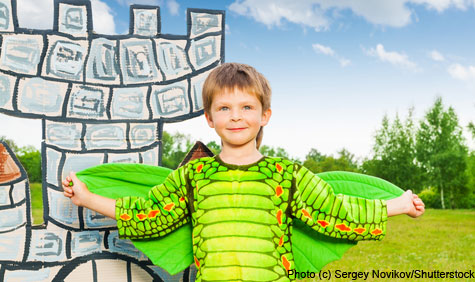|

The Importance of Building Your Child's Imagination through Play
By Sam Flatman
For many parents, pretend play appears to be a waste of their child’s time and effort. But, in fact, it is the times when children disengage from reality that they are actually learning the most about the world around them. In order to understand this, you have to look at imaginative play as practise for real life situations.
When adults find themselves daydreaming, it’s often because they are working through a scenario in their heads. The same goes for kids when they dress up or run around the garden with their pants on their heads. Because children are new to the concepts of problem-solving, empathy and creativity, they need a way to put these ideas into practice. If you prevent them from learning in this manner, it can have a detrimental effect on the way they deal with difficult situations in the future.
Understanding Emotions through Imaginative Play
One of the core reasons children begin to play from such a young age is the level of emotional learning that can arise for it. Emotions are tricky for any of us to get our head around, but for children, it is necessary to quickly understand the difference between when someone is upset and when they are happy.
Imaginative play makes this process easier because children can mimic the behavior of their parents or other adults and begin to judge situations for themselves. Whilst on one level, doctors and nurses is just a game, on another level it is an exercise in understanding the emotional and social impact of visiting a hospital or doctor’s surgery. This doesn’t mean you should be teaching your child about pain and suffering from the age of three, it simply means they should be allowed the time to try and work out these issues for themselves.
Learning Self-expression through Unstructured Play
Whilst structured activities such as sports are important, learning to think and create for themselves should be a fundamental part of children’s lives. The cognitive development associated with unstructured play is vast and should never be undervalued. Even simple activities like stacking blocks or creating shapes in sand can do wonders for a child’s creativity. By allowing them to approach a task in their own way, you enable them to come up with new ways of tackling it. Innovation like this should never be discouraged, as it’s what drives their curiosity. Structured play helps children understand the importance of certain rules and regulations, but it’s the introduction of unstructured play that helps them redefine these boundaries.
Building On Social Skills through Shared Play
Another major upside to creative play is the social lessons that can be taught through it. Getting children to interact with one another at a young age isn’t always easy, but by turning the social aspect into a game, you can encourage your children to play together. You only have to watch a group of nursery children racing cars or dressing dolls together to realise the social impact of these activities. These toys aren’t simply something to keep them entertained, they are also conduits for testing out conversational skills and ideas they have picked up from adults.
An activity such as water play allows children to transform a plastic bottle into a ship or a submarine and begin to think about how it might feel to be on board one of these. Although this might seem like a very simple step, it can really open up the mind of a child. Whilst they are cooperating with one another, you can begin to introduce the concepts of sharing and accepting other people’s ideas, in order to help them understand the benefits of working with others.
Sam Flatman is an outdoor learning specialist and an Educational Consultant for Pentagon Play. He has been designing playgrounds for the past ten years and has a real passion for outdoor education. He believes that outdoor learning is an essential part of child development, which can be integrated into the school curriculum. You can visit Pentagon on Facebook or follow them on Twitter.
Copyright © Life Media
Privacy Policy
 



|

